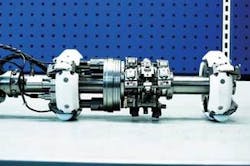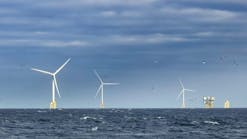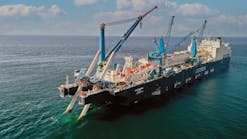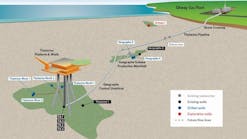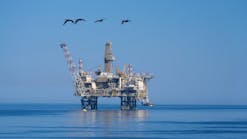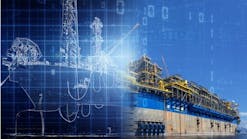AGR Group CEO Sverre Skogen.
Demand for AGR Group’s range of services has helped the company grow rapidly in recent times, strengthening its international presence. This is not a strategy of growth for growth’s sake, but the considered addition of operations which complement and extend the company’s existing capabilities, according to CEO Sverre Skogen.
Norway-based AGR has been in the news regularly for its acquisitions. In the last couple of years it has taken over Drilling Production Technology (DPT), Triangle Technology and Reservoir Evaluation Services (RES) in Norway, Peak Group, Technology Design and SeaVation in the UK, Safe Control in Sweden, Upstream Petroleum in Australia, and F J Brown & Associates in the US, and last year took a 51% interest in Houston-based Horton Technologies Inc.
The WeldScan tool is one proprietary technology offered by AGR for inline pipeline inspection.
In addition, the group has undergone significant organic growth as a result of demand for its services. The resulting overall growth can be seen in its 2006 financial accounts: operating revenues of NKr 1.73 billion, up 83% on the previous year, and EBITDA of NKr 264 million, up 77%.
AGR, which last year listed on the Oslo stock exchange and changed its name from Ability Group, has its roots going back a couple of decades to small Norwegian entrepreneurial companies established to provide technology and services to the offshore oil industry. That entrepreneurial spirit is the “backbone of our success,” Skogen says.
When a new company joins the AGR ranks, the policy is to give it the freedom to continue in the successful ways that attracted the group to it in the first place.
“We don’t want to swamp the individuality of new arrivals,” says Skogen. “We want to nurture their entrepreneurial spirit.”
As its international operations have expanded, AGR has established two geographical hubs outside its European base, in Houston to serve the Americas and in Australia to serve the Asia-Pacific region. Functionally, the group’s operations are divided into three business areas: petroleum services, drilling services, and field operations.
Petroleum services
Though established only two years ago, petroleum services now accounts for more than 50% of group revenues. Among its services is a competence in subsurface disciplines: in Norway, it has a team of more than 40 geologists and geophysicists, making it the largest independent G+G group, and another team of 15 in Kazakhstan.
This division also is responsible for AGR’s well construction operations and its successful multi-well, multi-client drilling programs aimed at smaller companies without the relevant in-house expertise. In 2005, the company drilled 27 wells on behalf of license operators. This year AGR has 63 on its books, 20 of which came with the acquisition of F J Brown. Through to end 2008, it has seven campaigns - four in the UK, one in Norway, and two in Australia.
Rig contractors also have responded positively to AGR’s initiative. AGR can offer long-term contracts while small operators, though constituting a significant market, cannot. AGR also simplifies matters for the rig contractors by saving them from having to deal with different sets of procedures and routines for each customer.
Drilling services
The drilling services business area offers a range of services, including technology such as Junk Trapper, a mechanical well cleaning tool, and Dynamic Desander, a tool for separating sand and gravel from fluid flows in wells.
However, it has made the biggest impact on the industry with the Riserless Mud Return (RMR) system, which is designed to recirculate and reuse the drilling fluids used to drill the tophole of wells. The mud and cuttings are collected in a tank at the wellhead and returned to the surface through a flexible hose.
The initial impetus for this technology came from the need to achieve zero discharge drilling in the Norwegian Barents Sea. But in addition to the environmental benefits, it has the advantage of reduced operating time - typically three to five days. Since it was piloted on the Troll field by Norsk Hydro and used by BP in the Caspian, industry uptake has been swift. AGR now has 12 RMR units in operation and another 18 on order.
RMR technology is being developed further in two joint industry projects. The water depth capability, currently limited to 800 m (2,625 ft), is being extended to 2,400 m (7,874 ft) in a JIP with BP and Shell. A field test is scheduled for early 2008. In another JIP with Petrobras and Hydro, the system is being developed for use during drilling of the whole well, thus opening the way to riserless drilling.
Field operations
Finally AGR offers field operations services. This can include the whole package, such as in Australia, where the company is duty holder on four fields. It also provides specialist services, notably in inspection and NDT (non-destructive testing). These include ultrasound technology for inline pipeline inspection, which has proved effective. AGR recently entered into a worldwide agreement to provide its technology and services to GE’s pipeline inspection operations.
Field operations also include the joint venture with Horton Technologies, under which the partners plan to design and develop a drilling and production unit for deployment on deepwater, high-pressure, high-temperature fields.
AGR also is involved in an FPSO project through a joint venture with Helix Energy Solutions. The partners have purchased a fuel supply vessel for conversion into an FPSO to be namedShiraz. Front-end engineering design for the conversion is to be completed in the autumn.


